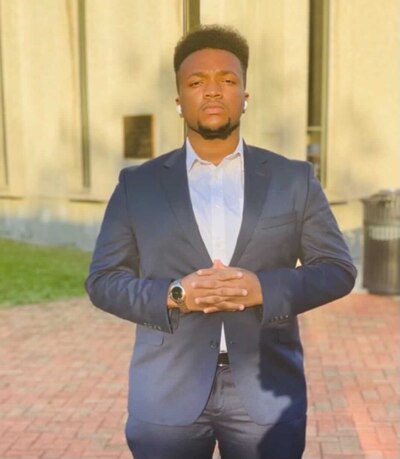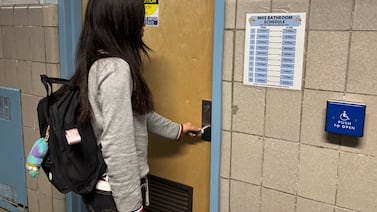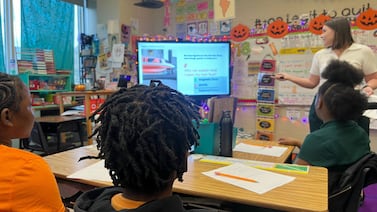Sign up for Chalkbeat Newark’s free newsletter to get the latest news about the city’s public school system delivered to your inbox.
At just 23, David Daughety is the first Generation Z member — and among the youngest people — elected to the Newark Board of Education, but he is no stranger to the work it takes to support city youth.
Daughety, a 2020 Arts High School graduate, has been a youth program coordinator, commissioner on the city’s civilian complaint review board, and Rutgers University student, who has experience revising Newark Public Schools policies and working with city organizations to develop youth programming.
In his first few months as a board member, Daughety plans to visit schools, gain district knowledge, and listen before he tackles any issues, he told Chalkbeat last week.
“I want to talk to the staff, the principals. I want to actually go and not just introduce myself, but actually put my ear to the ground,” Daughety said. “I know about the work that [board members] do, but I want to be able to actually see what’s going on for myself.”
Daughety ran on the Moving Newark Schools Forward slate, a ticket backed by Mayor Ras Baraka and other powerful Democratic lawmakers, alongside his running mates, incumbent Kanileah Anderson and city firefighter Louis Maisonave. Daughety’s winning team is part of a slate that has won every school board election since 2016 and, traditionally, makes few attempts to push back on Superintendent Roger León’s policies and ideas during board meetings.
The new member and his running mates secured the lead on April 15, earning them three-year terms on the nine-member school board. They take their oaths of office at a reorganization meeting on May 1.

On social media, former board members and city leaders praised Daughety for his win and pointed to his work with youth and education, which stems back to his time as a student at Arts High School. Daughety joins the ranks of other young board members – including former board members Marques Aquil-Lewis, first elected in 2009 when he was 21, and A’Dorian Murray-Thomas, who was elected in 2019 at 23.
New generation of leaders enters state, local politics
Gen Z — defined as the generation born between 1997 and 2012 — grew up amid the rise of smartphones, social media, and a global pandemic, but now is running for elected offices at the local, state, and national levels. The rate of young people ages 18 to 25 who seek elected seats has increased in the past 10 years, and more than 20% of youth say they would consider running for office, according to a 2022 study from Tufts University’s Center for Information and Research on Civic Learning and Engagement.
Among the best-known Gen Z elected officials are U.S. Rep. Maxwell Frost (D-Fla.), the first Gen Z in the U.S. Congress, Maryland state Del. Joe Vogel (D-Montgomery County), and vice chair of the Democratic National Committee David Hogg, a Parkland High School shooting survivor aiming to unseat longtime lawmakers in upcoming primaries.
In New Jersey, a new fundraising political action committee known as Gen Z for New Jersey was launched with a mission to uplift and empower young leaders across the state to run for office and fund their campaigns.
In Newark, Daughety’s election marks the start of a new generation becoming civically engaged, said Murray-Thomas, the youngest woman elected to the Newark Board of Education. She said Daughety is a prime example of the power of Gen Z because he is “someone who is willing to speak truth to power at a time when it is needed.”
“Our young people, their families, and our communities are under attack at every angle,” Murray-Thomas said. “Now more than ever, we need leaders, we need truth-telling leaders on the board of education, and David is that type of person.”
As board members, the candidates elected this month will be tasked with holding Leòn accountable, reviewing district finances in light of looming federal cuts, and addressing recent criticism from the community over transparency in addressing racism in schools.
The Newark school board has rarely challenged León’s policies.
Recently, León and the board tried to unseat a six-year board member after her daughter filed a legal claim against the district, alleging that she experienced racial harassment during her time as a student. Both the board member and her daughter had been vocal about the racial discrimination that students and teachers said they faced at the Newark School of Global Studies. León has also said the district will not cover the attorneys fees of two former board members at the center of ethics complaints initiated by a Newark principal.
Gen Z board member plans to center youth in policies
Daughety said he understands there is information that’s public and “privy to the board itself” and wants to understand legalities and statutes around board members’ roles before carving a path forward.
“I know a lot of information will be accessible to me as a board member and I’ll be able to actually say, okay I know this, and I know the public knows this much, how can we bridge that gap of information and transparency and come together to put a solution forward, for accountability to be held, but also for healing to take place,” Daughety added.
During his time as a student in Newark Public Schools, Daughety attended First Avenue Elementary School and then Arts High School, where he served as student body president for three years, senior class president, National Honors Society vice president, debate captain, student representative to the Board of Education, and co-chair of the Newark Students Union. In 2021, Daughety wrote a policy amendment that established the district’s first Student Governance Committee.
At a school board candidate forum last month, Daughety said his two main priorities are protecting essential student support services and expanding public-private partnerships, a goal based on his community-oriented mindset. He added that mental health services, especially after-school programs and special education support “must remain priorities.”
Daughety believes it’s important to create partnerships with local businesses, universities, and community organizations to support funding for career training so students who do not want to go to college are prepared.
“I believe coming from the perspective of knowing we operate locally will allow me to be able to influence the rest of the board, or at least attempt to have conversations with them about how we fully step into our authority as a fully authorized locally controlled board,” Daughety said.
Elected to the board at 23, Murray-Thomas also said her unique perspective is a superpower that she shares with Daughety. But young elected officials also have to “build on what’s been done before us” and set an example for generations to come, Murray-Thomas added.
The role “is such a unique privilege and responsibility because when the young people, the students, see you, they really see what is possible for them,” Murray-Thomas said. “It is rare for young people, especially young Black people, young Latinos, folks of color in general, to see enough reflections of themselves reflected in positive ways.”
Daughety’s win on April 15 came as Newark’s 16- and 17-year-olds voted for the first time in a school board election. Nearly 1,800 teens registered to vote and advocates and organizers spent weeks getting students registered and vote ready. City leaders also hoped youth voters would impact the school board election, which historically has drawn around 3% to 4% of registered voters, but overall turnout in this year’s election hovered around 3% while turnout among the registered 16- and 17-year-olds was just under 4% according to unofficial results.
Daughety said voter turnout could increase if the school board elections were moved to November’s general election. He also wants to expand the youth vote next year and civic engagement efforts across the district.
“You can’t have high expectations for young people if the adults themselves aren’t living up to theirs in the election,” Daughety said. “Because to me, that’s the most important election in the city of Newark, local elections, the school board election.”
Jessie Gómez is a reporter for Chalkbeat Newark, covering public eetucation in the city. Contact Jessie at jgomez@chalkbeat.org.





